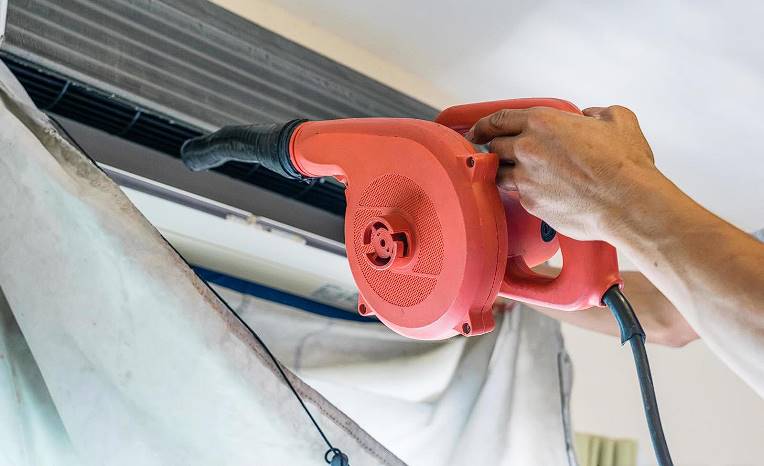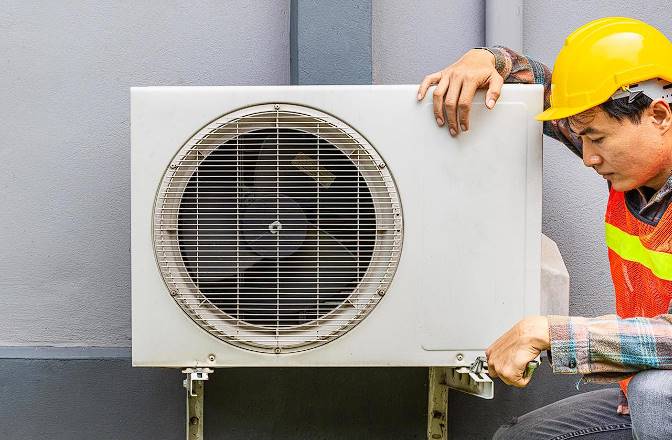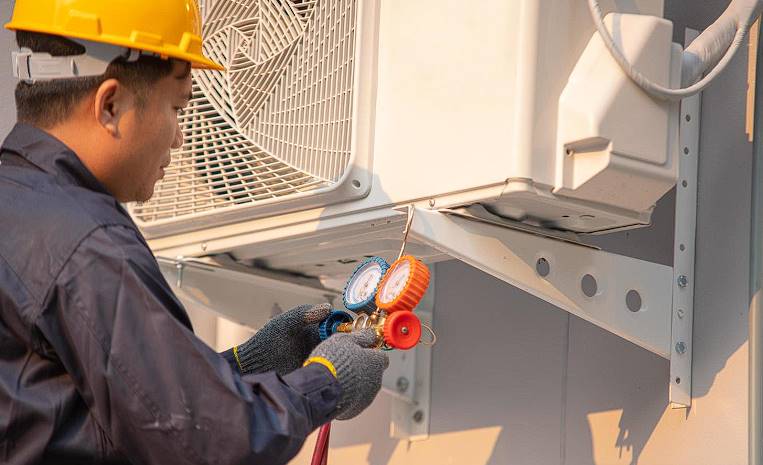Like any other machine, air conditioners benefit from regular maintenance if you want to get the most out of them. And the air conditioners that need to be maintained properly are the ones that have the most trouble.
You shouldn't freak out if your air conditioner suddenly stops working. We know you're concerned about providing the best possible air conditioner maintenance. That involves taking measures to avoid the most typical AC issues in the first place.
Unfortunately, home AC issues can arise despite your best efforts to prevent them. When they happen, detecting house AC problems and getting them addressed as quickly as possible is critical so it doesn't produce a chain reaction of more costly issues.
For your peace of mind and the health of your air conditioner, we have compiled this list of the most common AC problems and solutions so that you can try them out before giving up and calling a pro.
Fixing and Diagnosing Common Home AC Problems:
Even brand-new air conditioning systems are susceptible to developing issues if improperly installed or maintained. If you're troubleshooting AC issues at home, look for these indicators.
The AC units Never Stop Turning On And Off
The Issue
The air conditioner is always operating but never reaches the desired temperature. If that's the case, your home will be too hot during the day (especially in the summer), and your energy bill will skyrocket.
How To Fix The Home AC Problem
Changing the air filter, spraying the exterior air box for debris, and maintaining an appropriate temperature routine during the day could be all needed. If none of those solutions works, however, it may be time to call a professional HVAC technician to check for leaks and possible replacement of system components.
The Air Conditioner Won't Turn On
The Issue
The thermostat and air conditioner have been turned on, but the unit still won't turn on.
How To Fix This Home AC Problem
Fix the circuit breaker if they caused the problem. However, you should have a professional electrician check the circuit breaker and wiring to ensure that turning on the air conditioner won't overload the system. Replace the thermostat or have an HVAC professional inspect it if you suspect it is at fault.
It's Not Clear If The Air Being Circulated Is "Conditioned" Or Not.
The Issue
When the air conditioner blows warm or cold air through the vents, the air does not seem "conditioned."
How To Fix This Home AC Problem
If the issue arises during the warmest part of the day, the system's capacity may need to be increased. To fix the problem, you should install a new HVAC system with variable speeds.
If you don't want to spend the money replacing your HVAC system, weatherising the home and cutting energy waste can greatly help. If the problem persists throughout the day, it's time to call an HVAC expert to figure out what's wrong and how to fix it.
That Air Conditioner Is Only Blowing Hot Air.
The Issue
The AC blows air just well, but it's hot air.
How To Fix This Home AC Problem
All that has to be done is a thorough cleaning of the system. It may be possible to fix the problem by replacing the air filter, cleaning the evaporator coil, and removing any obstructions, such as leaves or debris, from the indoor and outdoor units. If none of those things work, however, it may be necessary to hire a technician to come and add more refrigerant to the system.
The Air Conditioner Keeps Tripping The Breaker.
The Issue
When the air conditioner kicks on, the breaker trips.
How To Fix This Home AC Problem
The air filter and the condenser coils are simple maintenance tasks that homeowners may do themselves. However, only a qualified electrician should adjust the electrical panel and wiring. A professional HVAC specialist will need to be called in to remedy any problems with refrigerant pressure.
The Air Conditioner Is Causing A Leak In The Ventilation System.
The Issue
The air ducts are dripping with water. Water leaks can cause damage to the air conditioning unit, walls, and flooring.
How To Fix This Home AC Problem
To assist in finding a solution, replacing the air filter and enhancing the insulation surrounding the ducts won't cause any harm. If, on the other hand, the issue appears to stem from the evaporator coil, the condensate drain line, or the refrigerant, you will need to contact an AC specialist to get this air conditioner issue fixed.
The Exterior Air Conditioner's Water Outlet Is Leaking.
The Issue
Water flowing from the external AC condenser outlet line indicates a more specific issue. It's a major issue that needs fixing immediately because it may indicate more serious issues with your air conditioner or even structural damage to your property.
How To Fix This Home AC Problem
If the air filter is unclean, that's the first item to change. Good news if that resolves the issue! If the problem persists, however, you'll need to call an HVAC technician to unclog the condensate drain line, replace the damaged pan, or reinstall the system.
Surface Dust Accumulates Rapidly
The Issue
Even though you just dusted your house a few days earlier, you now see a fine film of dust covering everything.
How To Fix This Home AC Problem:
This is typically a quick and simple remedy. Changing your air filter should fix the issue by trapping impurities. However, a professional duct inspector may be necessary if there are leaks in the ducting. Aluminium foil sealing tape for HVAC systems can be used to patch minor leaks. A professional should be called in for larger leaks.
One Of The Rooms In The House Has Freezing Air Conditioning.
The Issue
Is there a certain room in your home that consistently feels cooler than the others? One major issue with residential air conditioning is that it will only cool certain rooms or areas.
How To Fix This Home AC Problem:
The key to solving this issue is adjusting the ventilation system so that air is distributed uniformly throughout the house. To balance or zone your HVAC system, you must first evaluate the vent configuration and air circulation throughout the home. When referring to an HVAC system, "zoning" refers to dividing the building into separate climate-controlled areas.
This is a smart plan for mansions or mansions with a lot of space. Dampers in the ductwork can be adjusted to reroute airflow and restore equilibrium. Altering the direction in which air enters a room can also be accomplished by opening and closing the registers. Depending on the inspection results, you may also need to insulate some areas of your home and repair the ductwork.
Burning Odour Emanates From The Blown Air.
The Issue
A telltale clue that anything is wrong is if the air from the vents has a smoky odour. The air around you may feel warmer than usual, too.
How To Fix This Home AC Problem:
The air filter is something a homeowner can fix themselves, but the other problems will require expert help. It could be as simple as replacing a faulty capacitor or as involved as getting a new motor.
Do You Have The Annual AC Tune-Up Scheduled?
Everyone who relies on air conditioners should schedule annual maintenance. Qualified experts thoroughly evaluate your AC system before deciding whether to repair or replace it. They will be able to find and fix any issues that may be jeopardising your life and cut your energy costs.
Your air conditioner's compressor, motor, capacitor, and other elements will function better and last longer if you have it inspected once a year. Air conditioners can gain 40% more efficiency if serviced regularly.
In addition to the money you'll save, maintaining your air conditioner regularly will safeguard your home from fire, electrocution, and other hazards caused by faulty wiring or a tripped circuit breaker. Periodically repairing old or broken parts can keep your air conditioner running for years.
Some of the components checked during a standard AC tune-up are as follows:
- Refrigerant levels are evaluated, and the system's components and controls are inspected.
- efficient lubrication and motion
- Adjusting the temperature setting on the thermostat and cleaning the evaporator, condenser coils, and filters
Troubleshooting Tips
- Verify that the thermostat is appropriately adjusted. The solution to a broken air conditioner is often as easy as adjusting the thermostat. If you mess with the settings, your air conditioner might not cool the way you want. Your thermostat is set to heat rather than cool. If this occurs, you might expect warm air to be emitted from your vents. When the seasons change, it's easy to overlook making the transition. Before you decide that your air conditioner is broken, make sure you examine this.
- Get new batteries for the thermostat. Have you recently inspected the thermostat's battery condition? If you last changed the batteries a long time ago, you can be dealing with a dead battery. Without working batteries, the thermostat can't talk to the AC system.
- Get a new air filter. When the filter becomes too dirty, airflow is restricted. Because of this, your AC won't work properly, if at all. In particular, unclean air filters can seriously damage a modern air conditioner. It's time to change the filters if you have not learned when you last did so.
- Check to see if the breaker is tripped. If it is, reset it. The next thing to try is the circuit breaker for the air conditioner.
- Verify that the vents are open. Clean out all of the vents and ducts in your home. If they become blocked with dust or filth, the airflow will be disrupted, and the solution to your troubles may be as simple as cleaning the vents in your home or business. There could be hidden problems in the ductwork as well. Infestations of mould or pests can ruin your air conditioner.
When to Call an HVAC Expert
There are many DIY solutions to common AC issues, but there are also times when it's best to call the pros for assistance.
- Do you hear strange banging, clanking, or other sounds from your air conditioner? There is likely a significant issue if you hear this from your AC or vents. An experienced HVAC technician will be able to diagnose the problem and fix it, but you can't do it yourself.
- Problems with the Outdoor Unit: You should not attempt to remedy the problem on your own if it is caused by the outdoor air conditioning unit. Changing the air filter and replacing the batteries are two examples of maintenance you may conduct without voiding the warranty. True maintenance difficulties are best handled by calling in the experts.
- You should have an expert reinstall or fix your air conditioner if you discover that it was not put in properly.
Conclusion
Damage to the air conditioner or the building itself may result from this.
Here's what you should do to resolve the problem:
- Remove any obstructions from the air filter and replace it.
- Inspect the air filter and condenser coils for any signs of leakage.
- The evaporator coil and the air filter should be changed.
- The fan blades in the air conditioner should be cleaned.
- Check for any debris in the air filter or condenser coils.
- Replace the fan blades and replace them if necessary.
- If these troubleshooting steps fail, call an HVAC expert to inspect and possibly replace your unit.
- If the issue persists, you should have a professional HVAC technician look at it.
- If the problem persists after these steps, a professional may need to clear the condensate drain line, repair the broken pan, or reinstall the system.
By following these methods, you can troubleshoot common air conditioning maintenance issues at home and ensure the health of your air conditioner. Avoid the hassle and expense of fixing your air conditioner later by following these guidelines.
Here's how to solve any AC issue at home:
- Swap out your dirty air filter with a new one.
- Make sure the house has enough airflow by adjusting the ventilation system.
- Assessing the vent layout and airflow might help you zone your HVAC system.
- To equalise the airflow again, just readjust the dampers in the ducting.
- Insulate some portions of your home and repair the ducting.
- See if there's a smoky smell coming from the vents.
- You may quickly fix the air filter yourself, but if the problem persists, call a technician.
Air conditioners need to have annual maintenance performed on them. Professionals may examine your setup, spot any problems, and recommend ways to reduce your energy bill. You may save money and avoid potential dangers like fire and electrocution by keeping your electrical system in good working order.
When troubleshooting an HVAC system, it's a good idea to start by adjusting the thermostat, replacing the thermostat batteries, swapping out the filter, checking to see if the circuit breaker has been tripped, and clearing out the vents and ducts.
If you need to call an HVAC professional, be ready for whatever comes up. If your air conditioner is making loud banging or clanking noises, there is probably a serious problem. If the outside unit malfunctions, you can replace the air filter and batteries without voiding the warranty.
In conclusion, professional assistance and maintenance are required to resolve an AC problem at home.
Content Summary
- Air conditioners can only function at their best if they are regularly serviced.
- Problems with air conditioning can arise in even brand-new systems if they are not properly installed or maintained.
- One typical issue is an ongoing operation that fails to achieve the target temperature.
- This could be fixed by replacing the air filter and cleaning the outdoor unit.
- A professional HVAC specialist may need to be called in if the problem cannot be fixed.
- Despite the temperature being in the ideal range, the air conditioner is not turning on.
- In case of problems, an electrician should be called in to check and repair circuit breakers.
- Air can circulate even if it isn't "conditioned."
- Weatherproofing the house or expanding the capacity of the existing system could help.
- If the problem persists, you should have a professional HVAC technician look at it.
- If your air conditioner releases hot air, it may need to be serviced or recharged.
- A professional should be called in if the problem persists after examining the filters, coils, and potential blockages.
- If the air conditioner's startup causes a breaker to trip, there may be an electrical or refrigerant problem.
- Filter and coil maintenance; electrical tweaks; refrigerant service.
- Damage to the unit and the property caused by leaking air ducts requires prompt attention.
- Improve insulation and change the filters, but if the problem persists, call an AC technician.
- The external air conditioner's filter needs to be changed or it will continue leaking water.
- Accumulation of surface dust rapidly suggests the need for a filter change and/or a duct examination.
- Rooms with different temperatures may require ventilation and ductwork changes.
- Thermal zoning, damper alterations, and insulation could all help bring things back in line.
- When vents emit a burning odour, it's best to have a technician take a look and possibly repair certain parts.
- Air conditioners need to be serviced once a year to ensure optimal performance and longevity.
- Regular maintenance saves money, minimises dangers, and increases AC lifespan.
- Tune-ups involve inspecting various parts, including refrigerant levels, lubricants, thermostat settings, coils, and filters.
- Troubleshooting tips include checking the circuit breakers, batteries, filters, and vents.
- If strange sounds continue or there are any outdoor unit issues, it is time to call in the HVAC technicians.
- If your air conditioner or vents are making strange noises, it's time to call in a pro.
- Professionals in the HVAC industry should fix any problems with the outdoor unit.
- If an installation was done incorrectly, it should be redone or fixed by experts.
- Troubleshooters can address thermostat settings to correct cooling issues.
- Dead batteries could cause a malfunctioning air conditioner in the thermostat.
- Airflow difficulties owing to unclean filters necessitate prompt replacements.
- Turn the power back on by resetting the breaker that tripped.
- Clean vents and ducts to ensure unimpeded airflow.
- A/C performance may be negatively impacted by mould or bug infestations in ducts.
- If your air conditioning or ventilation system makes strange noises, you should have a professional inspect it.
- If you want to keep your warranty intact and fix your outdoor unit, call a pro.
- It's quite safe for homeowners to perform routine maintenance tasks like changing filters and batteries.
- Experts should handle issues that are particularly complex during installation.
- Professionals in heating, ventilation, and air conditioning should fix any faulty installations.
Frequently Asked Questions
Uneven cooling can result from improperly sized AC units, blocked vents, or leaky ductwork. Ensuring vents are open and unobstructed and addressing any ductwork issues can help resolve this problem.
No, refrigerant handling requires specialised equipment and expertise. To prevent damage and ensure safety, refrigerant-related issues should only be handled by certified professionals.
If basic troubleshooting doesn't resolve the issue, or if unusual smells, leaks, or persistent problems are present, contact a professional HVAC technician.
Regular maintenance, such as cleaning or replacing filters, clearing debris around the outdoor unit, and scheduling professional inspections, can extend the lifespan of your AC system.
While it's unnecessary, covering the outdoor unit can protect it from debris, leaves, and harsh weather. Ensure the cover is designed for AC units and allows for proper airflow.



